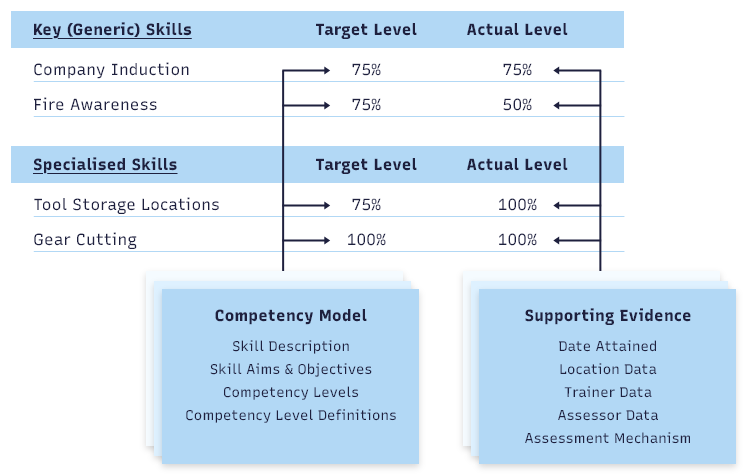Competency Frameworks
A collection of skill competency models form the basis for a competency framework. A competency framework may apply to a specific individual's job role, or to a collection of individuals such as a department or workplace function.
Using a detailed competency model requires slightly more effort to populate, but allows for extremely rich monitoring and reporting capability.
Evidence of Competency
In addition to recording an individual’s competency levels, it is also recommended that an effort is made to capture and record supporting evidence to support this. For example, attendance at training events should be recorded, along with feedback following the event. This supporting evidence will usually be required by auditors who need to ascertain how your organisation provides proof of the recorded levels.
The following diagram shows an example competency framework for a machine operator in a manufacturing company. For brevity, this example only shows a few key skills:

From the above diagram it becomes clear that capturing and monitoring competency levels that incorporate detailed approaches is not suitable for paper-based mechanisms. In fact, software packages such as Microsoft Excel may also begin to struggle due to the multi-dimensional nature of frameworks. It therefore falls to software databases to effectively manage this data.
Competency Framework Templates
There are many sites on the internet that sell competency framework templates. You may choose to use some of these to begin gathering information to use for your own competency frameworks. Although framework templates can be a useful place to start, there are some points that should be raised before doing this:
- The template’s skills may not cover the breadth of skills that you need to monitor
- The template’s skills may contain lots of entries that are not relevant to your organisation
-
Does the template come with competency level definitions?
- If so, are these suitable for your organisation?
- The template may be full of soft skills that add little value (see later)
Many organisations chose to develop their own frameworks, which provide meaningful and relevant data.
Soft Skills in the Competency Framework
When gathering skills to use within a framework, there is often a tendency to include soft skills such as Commitment, or Enthusiasm. You should be careful about including this type of information for two reasons:
- They must be graded in a subjective manner, which can lead to disagreements
- A person’s level of commitment or enthusiasm may not be related to how competent they are. For example, a workplace skill champion may have to deal with low-value company policies that lower their level of enthusiasm. Discussions about soft-skills and the reasons for effects upon them are often best left to personal appraisals.
Competence versus Experience
Many sources of information state that competence develops with experience, but this is not necessarily true. A member of staff may work for an organisation for many years, but will never reach the ideal level of competence without fundamental training. This is especially true if bad habits are copied from other colleagues who have also not received the correct level of training.
Organisations must monitor output against specified targets in order to decide whether staff are truly competent or not.